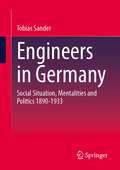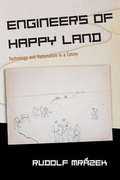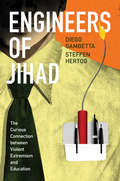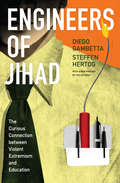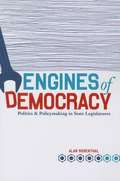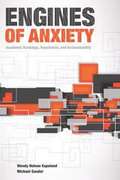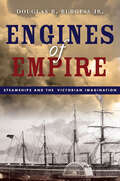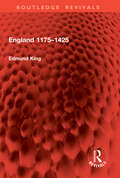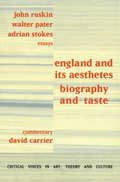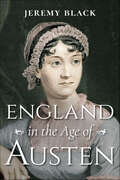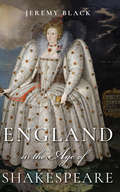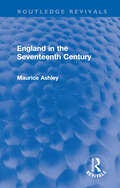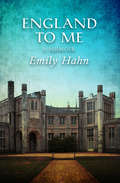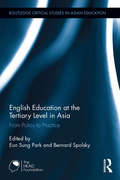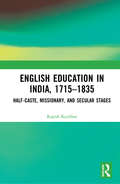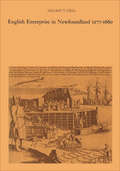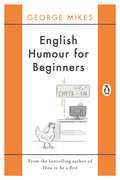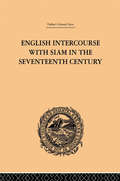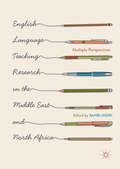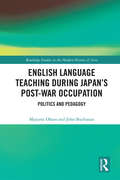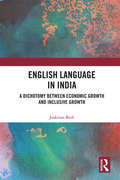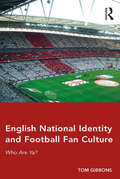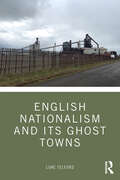- Table View
- List View
Engineers in Germany: Social Situation, Mentalities and Politics 1890-1933
by Tobias SanderEngineers represent the (industrial) modern age like no other profession. In the German Empire and the Weimar Republic, however, the enormous numerical expansion of the profession was contrasted by comparatively unfavorable working conditions and incomes. This was particularly true of the graduate engineers, whose academization failed to meet industrial requirements. Can the völkisch, right-wing political radicalization of many technical experts on the eve of the 'Third Reich' actually be fully explained by these professional-social frictions?Data on the professional-social situation, consumption, leisure time and political behaviour of engineers in the higher and academic professions, which have been made available for the first time, already reveal the contours of late-modern, contemporary society in the period under consideration. This makes more complex explanatory approaches necessary and enables general insights into the dynamics of social crises.This study of (historical) professional, inequality, and political sociology is published in its third, fully revised edition.This book is a translation of an original German edition. The translation was done with the help of artificial intelligence (machine translation by the service DeepL.com). A subsequent human revision was done primarily in terms of content, so that the book will read stylistically differently from a conventional translation.
Engineers of Happy Land: Technology and Nationalism in a Colony
by Rudolf MrazekBased on close reading of historical documents--poetry as much as statistics--and focused on the conceptualization of technology, this book is an unconventional evocation of late colonial Netherlands East Indies (today Indonesia). In considering technology and the ways that people use and think about things, Rudolf Mrázek invents an original way to talk about freedom, colonialism, nationalism, literature, revolution, and human nature.
Engineers of Jihad
by Diego Gambetta Steffen HertogThe violent actions of a few extremists can alter the course of history, yet there persists a yawning gap between the potential impact of these individuals and what we understand about them. In Engineers of Jihad, Diego Gambetta and Steffen Hertog uncover two unexpected facts, which they imaginatively leverage to narrow that gap: they find that a disproportionate share of Islamist radicals come from an engineering background, and that Islamist and right-wing extremism have more in common than either does with left-wing extremism, in which engineers are absent while social scientists and humanities students are prominent. Searching for an explanation, they tackle four general questions about extremism: Under which socioeconomic conditions do people join extremist groups? Does the profile of extremists reflect how they self-select into extremism or how groups recruit them? Does ideology matter in sorting who joins which group? Lastly, is there a mindset susceptible to certain types of extremism? Using rigorous methods and several new datasets, they explain the link between educational discipline and type of radicalism by looking at two key factors: the social mobility (or lack thereof) for engineers in the Muslim world, and a particular mindset seeking order and hierarchy that is found more frequently among engineers. Engineers' presence in some extremist groups and not others, the authors argue, is a proxy for individual traits that may account for the much larger question of selective recruitment to radical activism. Opening up markedly new perspectives on the motivations of political violence, Engineers of Jihad yields unexpected answers about the nature and emergence of extremism.
Engineers of Jihad: The Curious Connection between Violent Extremism and Education
by Diego Gambetta Steffen HertogThe violent actions of a few extremists can alter the course of history, yet there persists a yawning gap between the potential impact of these individuals and what we understand about them. In Engineers of Jihad, Diego Gambetta and Steffen Hertog uncover two unexpected facts, which they imaginatively leverage to narrow that gap: they find that a disproportionate share of Islamist radicals come from an engineering background, and that Islamist and right-wing extremism have more in common than either does with left-wing extremism, in which engineers are absent while social scientists and humanities students are prominent.Searching for an explanation, they tackle four general questions about extremism: Under which socioeconomic conditions do people join extremist groups? Does the profile of extremists reflect how they self-select into extremism or how groups recruit them? Does ideology matter in sorting who joins which group? Lastly, is there a mindset susceptible to certain types of extremism?Using rigorous methods and several new datasets, they explain the link between educational discipline and type of radicalism by looking at two key factors: the social mobility (or lack thereof) for engineers in the Muslim world, and a particular mindset seeking order and hierarchy that is found more frequently among engineers. Engineers' presence in some extremist groups and not others, the authors argue, is a proxy for individual traits that may account for the much larger question of selective recruitment to radical activism.Opening up markedly new perspectives on the motivations of political violence, Engineers of Jihad yields unexpected answers about the nature and emergence of extremism.
Engines Of Democracy: Politics And Policymaking In State Legislatures
by Alan RosenthalState legislators have often been in the shadow of their national counterparts, but they drive the processes of democracy. Rosenthal brings together a lifetime of research and experience on state legislative politics into one eminently readable volume, Building on earlier work with new data and recent interviews and observations, Both a complement and contrast to the policymaking process on Capitol Hill, Engines of Democracy proves that no one gives insight into state legislators and their work the way Alan Rosenthal can.
Engines of Anxiety: Academic Rankings, Reputation, and Accountability
by Michael Sauder Wendy Nelson EspelandStudents and the public routinely consult various published college rankings to assess the quality of colleges and universities and easily compare different schools. However, many institutions have responded to the rankings in ways that benefit neither the schools nor their students. In Engines of Anxiety, sociologists Wendy Espeland and Michael Sauder delve deep into the mechanisms of law school rankings, which have become a top priority within legal education. Based on a wealth of observational data and over 200 in-depth interviews with law students, university deans, and other administrators, they show how the scramble for high rankings has affected the missions and practices of many law schools. Engines of Anxiety tracks how rankings, such as those published annually by the U.S. News & World Report, permeate every aspect of legal education, beginning with the admissions process. The authors find that prospective law students not only rely heavily on such rankings to evaluate school quality, but also internalize rankings as expressions of their own abilities and flaws. For example, they often view rejections from “first-tier” schools as a sign of personal failure. The rankings also affect the decisions of admissions officers, who try to balance admitting diverse classes with preserving the school’s ranking, which is dependent on factors such as the median LSAT score of the entering class. Espeland and Sauder find that law schools face pressure to admit applicants with high test scores over lower-scoring candidates who possess other favorable credentials. Engines of Anxiety also reveals how rankings have influenced law schools’ career service departments. Because graduates’ job placements play a major role in the rankings, many institutions have shifted their career-services resources toward tracking placements, and away from counseling and network-building. In turn, law firms regularly use school rankings to recruit and screen job candidates, perpetuating a cycle in which highly ranked schools enjoy increasing prestige. As a result, the rankings create and reinforce a rigid hierarchy that penalizes lower-tier schools that do not conform to the restrictive standards used in the rankings. The authors show that as law schools compete to improve their rankings, their programs become more homogenized and less accessible to non-traditional students. The ranking system is considered a valuable resource for learning about more than 200 law schools. Yet, Engines of Anxiety shows that the drive to increase a school’s rankings has negative consequences for students, educators, and administrators and has implications for all educational programs that are quantified in similar ways.
Engines of Empire: Steamships and the Victorian Imagination
by Douglas BurgessIn 1859, the S.S. Great Eastern departed from England on her maiden voyage. She was a remarkable wonder of the nineteenth century: an iron city longer than Trafalgar Square, taller than Big Ben's tower, heavier than Westminster Cathedral. Her paddles were the size of Ferris wheels; her decks could hold four thousand passengers bound for America, or ten thousand troops bound for the Raj. Yet she ended her days as a floating carnival before being unceremoniously dismantled in 1889. Steamships like the Great Eastern occupied a singular place in the Victorian mind. Crossing oceans, ferrying tourists and troops alike, they became emblems of nationalism, modernity, and humankind's triumph over the cruel elements. Throughout the nineteenth century, the spectacle of a ship's launch was one of the most recognizable symbols of British social and technological progress. Yet this celebration of the power of the empire masked overconfidence and an almost religious veneration of technology. Equating steam with civilization had catastrophic consequences for subjugated peoples around the world. Engines of Empire tells the story of the complex relationship between Victorians and their wondrous steamships, following famous travelers like Mark Twain, Charles Dickens, and Jules Verne as well as ordinary spectators, tourists, and imperial administrators as they cross oceans bound for the colonies. Rich with anecdotes and wry humor, it is a fascinating glimpse into a world where an empire felt powerful and anything seemed possible--if there was an engine behind it.
England 1175–1425 (Routledge Revivals)
by Edmund KingDuring the years 1175–1425, English society developed in many ways. First published in 1979, England 1175–1425 offers an ideal introduction to the period, presenting as it does a view of a whole society that is derived from a study of economic, social, political, and administrative history. It argues that the later Middle Ages in England saw the creation of a single, integrated society, with a national economy and a national political consciousness, and it shows how this integration came about.The foundations of a unified community are seen in chapters on settlement, on lordship and on the world of ideas, while the development of this community is seen in chapters on political and social themes. The author describes how parliament became the political focus of the nation and stresses the importance of warfare and war taxation in this development. Original features of the book are the integration into a general survey of work on medieval archaeology, and a chapter on ideas which uses a wide range of material to present a picture of the attitudes which governed men’s lives. The Peasants’ Revolt of 1381 demonstrates especially clearly the argument that all classes of society shared similar ideas, and the episode is examined in detail.There is an emphasis throughout on quotations from original sources and these, together with the illustrative matter provide a clear picture of a society in a period of change.
England and its Aesthetes: Biography and Taste (Critical Voices in Art, Theory and Culture)
by David CarrierFirst Published in 1999. Routledge is an imprint of Taylor & Francis, an informa company.
England in the Age of Austen
by Jeremy Black“This brisk, decorous, and incisive history . . . would have delighted its namesake as much as it will delight and instruct contemporary readers.” —Roger Kimball, Editor and publisher, The New CriterionDedicated fans of Jane Austen’s novels will delight in accompanying historian Jeremy Black through the drawing rooms, chapels, and battlefields of the time in which Austen lived and wrote. In this exceedingly readable and sweeping scan of late eighteenth- and early nineteenth-century Britain, Black provides a historical context for a deeper appreciation of classic novels such as Pride and Prejudice, Emma, and Sense and Sensibility. While Austen’s novels bring to life complex characters living in intimate surroundings, England in the Age of Austen provides a fuller account of what the village, the church, and the family home would really have been like. In addition to seeing how Austen’s own reading helped her craft complex characters like Emma, Black also explores how recurring figures in the novels, such as George III or Fanny Burney, provide a focus for a historical discussion of the fiction in which they appear. Jane Austen’s world was the source of her works and the basis of her readership, and understanding that world gives fans new insights into her enduring literature.“Superb. . . . Essential reading for the Austen enthusiast.” —William Gibson, Oxford Brookes University“England in the Age of Austen recovers a world before the Victorians that brings one of our greatest authors into clearer focus.” —William Anthony Hay, Mississippi State University“An absolute ‘must’ for the legions of Jan Austen fans . . . an extraordinarily well written history, impressively detailed, and a seminal work of original scholarship.” —Midwest Book Review
England in the Age of Shakespeare
by Jeremy BlackHow did it feel to hear Macbeth’s witches chant of "double, double toil and trouble" at a time when magic and witchcraft were as real as anything science had to offer? How were justice and forgiveness understood by the audience who first watched King Lear; how were love and romance viewed by those who first saw Romeo and Juliet? In England in the Age of Shakespeare, Jeremy Black takes readers on a tour of life in the streets, homes, farms, churches, and palaces of the Bard’s era. Panning from play to audience and back again, Black shows how Shakespeare’s plays would have been experienced and interpreted by those who paid to see them. From the dangers of travel to the indignities of everyday life in teeming London, Black explores the jokes, political and economic references, and small asides that Shakespeare’s audiences would have recognized. These moments of recognition often reflected the audience’s own experiences of what it was to, as Hamlet says, "grunt and sweat under a weary life." Black’s clear and sweeping approach seeks to reclaim Shakespeare from the ivory tower and make the plays’ histories more accessible to the public for whom the plays were always intended.
England in the Seventeenth Century (Routledge Revivals)
by Maurice AshleyOriginally published in 1952 but here reissuing the updated edition of 1978, this book has long been established as a classic and a central text for students of seventeenth-century English history. The book covers every aspect of English life from the arrival of James I in England to the death of Queen Anne. The chapters on political history are organized chronologically, interspersed with thematic chapters which analyse change and development in family and social life, literature and the arts, scientific and philosophical ideas and the growth of the first British Empire.
England to Me: A Memoir (American Autobiography Ser.)
by Emily HahnAuthor of such celebrated and acclaimed works as The Soong Sisters, China to Me, and Fractured Emerald: Ireland, Emily Hahn has been called by the New Yorker &“a forgotten American literary treasure.&” Now Hahn is reintroduced to a new generation of readers, bringing to light her richly textured voice and unique perspective on a world that continues to exist through both history and fiction.It was August 2nd, 1946, when we arrived. The war was not so long over that we had shed every reminder of it, even in New York, and the Queen Mary was still fitted up as a troopship. From this opening, Emily Hahn&’s England to Me takes readers into a world filled with uncertainty as she tries to settle into the English countryside after her harrowing years in the Far East. From Southampton to London, here is a portrait of a country in flux, and of a woman of strong insight determined to find her place in it.
English / Spanish Basics for Orientation and Mobility Instructors
by Christian J. FoyThis book was written as a teaching aid for orientation and mobility (O&M) instructors. Author's intention is not to teach the techniques of the profession but to supply the vocabulary instructors might use to teach students in Spanish.
English Education at the Tertiary Level in Asia: From Policy to Practice (Routledge Critical Studies in Asian Education)
by Bernard Spolsky Eun Sung ParkThis is the third volume of a trilogy on English Language education in Asia within the Routledge Critical Studies in Asian Education. Put together by editors and contributors selected by Asia TEFL, this book provides a timely and critical review of the current trends in tertiary level English education in Asia. It foregrounds the developments and trends, policies and implementation, as well as research and practice. Written by ELT scholars and educational leaders, this book presents articles on China, Hong Kong, India, Japan, Korea, Malaysia, the Philippines, Singapore, Thailand, and Vietnam. While the authors focus on their own local issues, providing an overview of the state of tertiary English teaching in their respective territories, they also provide insights from their successes and failures which can help inspire solutions to similar challenges faced internationally in the field. Chapters in the book include: • Heading toward the global standardization of English education in Korean universities • English in tertiary education in India: A Janus-faced perspective with special reference to University of Delhi • Developing English language skills in the Singapore higher education context • ELT at tertiary institutions in China: A developmental perspective This book will be valued by administrators, researchers and scholars interested in bilingualism, language policy and planning in higher education.
English Education in India, 1715-1835: Half-Caste, Missionary, and Secular Stages
by Rajesh KochharThis book identifies and describes the first stage in the advent and growth of English education in India. The first schools in India were the charity schools, asylums and orphanages opened under the auspices of the Church of England for religious instruction, training and care of ‘half-caste’ or mixed-race children, the progeny of Protestant fathers from Indian women. It examines the influence of the ‘half-caste’ community and the missionaries on the growing Indian demand for English education and opportunities for employment. The well-entrenched scenarios on the pre-history of Hindoo College Calcutta are re-examined in the light of new evidence discussed here for the first time. The book further analyses the shifts in the educational policies by the British colonial administrators and the interventions by the likes of Trevelyan, Macaulay and Bentinck. Detailed and insightful, this volume will be of great interest to students and researchers of history, literature, postcolonial studies, cultural studies, colonial expansion, and South Asian studies.
English Enterprise in Newfoundland 1577-1660
by Gillian CellBetween 1577 and 1660 Newfoundland emerged from relative obscurity to become the centre of a booming and valued industry, the site of one of England's first colonies, and a place of such strategic importance that the English government could not afford to ignore it. From the time of its discovery in the late fifteenth century, the fishermen of Western Europe made annual fishing voyages to Newfoundland. Over a hundred years later, in 1610, the island became the site of England's second permanent colony in North America. The conflict which began at that time between settlers and fishermen has characterized much of the island's history. This volume examines the two themes of settlement and the fishery. The value of the fishery has been accepted readily enough, but until now no systematic analysis has been made of the industry's growth during its first great period of expansion in the last quarter of the sixteenth century or of its position in the commerce of the ports of western England. Such an analysis is presented in this volume. The author has used customs' records and local port records, summarizing her finds in tables and graphs. While the figures are incomplete and the conclusions drawn from them necessarily tentative, this book is nevertheless an important step in charting the development of England's first transatlantic trade.The earliest attempts to colonize the unsympathetic island of Newfoundland are the least known part of the story of English settlement in North America. Now, thanks to the use of new documentation, in particular a substantial collection of papers relating to the Newfoundland Company, it can be argued that both the company's colony at Cupid Cove and the independent settlements which were its offshoots were far more serious and long-lived enterprises than has often been though. They formed a vital part of the colonial experiences and experiments of the seventeenth century.The story of English activity in Newfoundland sheds further light on the expansion of England. Both the fishing voyages and the first settlements were originally private ventures. But as the European rivalries in the New World continued and as mercantilist theories made colonies increasingly valuable assets, so Newfoundland's importance as a training ground for sailors and as a strategic element in the control of the north Atlantic became more obvious. By the mid-seventeenth century Newfoundland had ceased to be simply a private concern. Somewhat slowly, somewhat reluctantly, the government moved in.
English Humour for Beginners
by George Mikes'To write a book is hard; to write a funny book is harder; to write a funny book both wise and funny is the prerogative of Mr. Mikes' The Times_________________________If you want to succeed here you must be able to handle the English sense of humour.So proclaims George Mikes' timeless exploration of this curious phenomenon. Whether it's understatement, self-deprecation or plain cruelty, the three elements he identifies as essential to our sense of humour, being witty here is a way of life.Perfectly placed as an adopted Englishman himself, Mikes delivers his shrewd advice - helpfully divided into 'Theory' and 'Practice' - with a comic precision that does his chosen country proud. Drawing on a trove of examples from our rich comic canon, from Orwell ("Every joke is a tiny revolution") to Oscar Wilde, this is the essential handbook for natives and foreigners alike.Mrs Kennedy: "I don't think, Mr Churchill, that I have told you anything about my grandchildren."Winston Churchill: "For which, madam, I am infinitely grateful."
English Identity and Political Culture in the Fourteenth Century
by Andrea RuddickThis broad-ranging study explores the nature of national sentiment in fourteenth-century England and sets it in its political and constitutional context for the first time. Andrea Ruddick reveals that despite the problematic relationship between nationality and subjecthood in the king of England's domains, a sense of English identity was deeply embedded in the mindset of a significant section of political society. Using previously neglected official records as well as familiar literary sources, the book reassesses the role of the English language in fourteenth-century national sentiment and questions the traditional reliance on the English vernacular as an index of national feeling. Positioning national identity as central to our understanding of late medieval society, culture, religion and politics, the book represents a significant contribution not only to the political history of late medieval England, but also to the growing debate on the nature and origins of states, nations and nationalism in Europe.
English Intercourse with Siam in the Seventeenth Century
by John AndersonOriginally published in 1890. This early works is a comprehensive and informative look at the subject and will appeal to any historian. Many of the earliest books, particularly those dating back to the 1900's and before, are now extremely scarce and increasingly expensive. We are republishing these classic works in affordable, high quality, modern editions, using the original text and artwork.
English Language Teaching Research in the Middle East and North Africa: Multiple Perspectives
by Sahbi HidriThis edited collection examines a range of English Language Teaching (ELT) research in the Middle East and North Africa (MENA). While the MENA context has witnessed considerable change in recent years, it has so far been under-represented in ELT research at both the regional and the international level. This book aims to fill that gap by surveying the current state of the field, examining in detail a range of issues and concepts, and suggesting future directions for further research. It will be of interest to ELT researchers and practitioners in general - not just those based in MENA contexts themselves.
English Language Teaching during Japan's Post-war Occupation: Politics and Pedagogy (Routledge Studies in the Modern History of Asia)
by John Buchanan Mayumi OharaIn 1945 Japan had to adjust very rapidly to sudden defeat, to the arrival of the American Occupation and to the encounter with the English language, together with a different outlook on many aspects of society and government. This scholarly book is based on in-depth interviews with people, now aged, who were school students at the time of the Occupation and who experienced first-hand this immense cultural change. The book considers the nature of the changing outlook, including democratization, the new role for the Japanese Emperor and all this represented for the place of tradition in Japanese life and the growing emphasis on individualism away from collectivism. It discusses the changing system of education itself, including new structures and new textbooks, and relates the feelings of the participants as they came to terms with defeat and the language and culture of the former enemy. Overall, the book provides a fascinating insight into a key period of Japanese history.
English Language in India: A Dichotomy between Economic Growth and Inclusive Growth
by Jaskiran BediThis book examines the relationship between the English language and growth – economic and inclusive – in India. It explores why English continues to be the language of aspiration long after Independence. With the second largest English-speaking population in the world today, India is testimonial to how a linguistic legacy continues to cast a long shadow on its contemporary discourse in the economic arena. The volume: Explores how English language proficiency constitutes as human capital. Draws in the latest India Human Development Survey data. Investigates the relationship between the language and economic indicators such as wages, household income and state growth. Purther investigates the role of English language in the inclusivity of growth. Provides a snapshot of the pedagogy of English in the Indian education system. First of its kind in scope, this volume will be of great interest to scholars of economics, education, sociolinguistics, development studies, politics and sociology. It will also be of great interest to the general reader.
English National Identity and Football Fan Culture: Who Are Ya?
by Tom GibbonsIn recent years, scholars have understood the increasing use of the St George’s Cross by football fans to be evidence of a rise in a specifically ’English’ identity. This has emerged as part of a wider ’national’ response to broader political processes such as devolution and European integration which have fragmented identities within the UK. Using the controversial figurational sociological approach advocated by the twentieth-century theorist Norbert Elias, this book challenges such a view, drawing on ethnographic research amongst fans to explore the precise nature of the relationship between contemporary English national identity and football fan culture. Examining football fans’ expressions of Englishness in public houses and online spaces, the author discusses the effects of globalization, European integration and UK devolution on English society, revealing that the use of the St George’s Cross does not signal the emergence of a specifically ’English’ national consciousness, but in fact masks a more complex, multi-layered process of national identity construction. A detailed and grounded study of identity, nationalism and globalization amongst football fans, English National Identity and Football Fan Culture will appeal to scholars and students of politics, sociology and anthropology with interests in ethnography, the sociology of sport, fan cultures, globalization and contemporary national identities.
English Nationalism and its Ghost Towns
by Luke TelfordIn order to understand today’s nationalism, we need to address the historical decline of working-class communities, the sense of loss brought by deindustrialisation and how working-class people have been denied a voice in society and politics. Discontent has manifested strongly in these deprived post-industrial areas, often branded as communities that have been left behind under neoliberal globalisation. Whilst more and more people are voicing their discontent with a system that fails to provide social security and economic stability, many researchers have branded them merely as racists, xenophobes and ill educated. Although prejudices are likely to play a part in all political outcomes, today’s dissatisfaction across the West cannot be reduced to mere emotion and intolerance. This book therefore utilises on-the-ground research with working-class individuals in a Leave voting locale in Britain, exploring their discontent with politicians, the Labour Party, the European Union, immigration, refugees and the prolonged calls for a second referendum. It situates this sentiment towards society and politics within the decline of capitalism's post-war era and the loss of well-paid industrial jobs, increase in non-unionised service employment and the hollowing out of community spirit.
